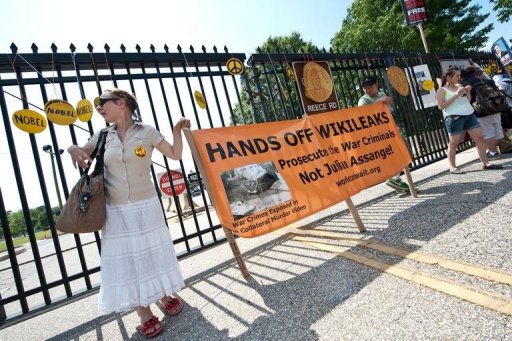Three years after his arrest in Iraq for allegedly causing America’s worst ever national security breach, US Army private Bradley Manning finally goes on trial Monday over his disclosures to WikiLeaks.
Manning, who faces a possible 154-year jail sentence, has offered to plead guilty to several offenses but he denies prosecutors’ most serious charge — that he knowingly aided the enemy, chiefly Al-Qaeda and Osama Bin Laden.
The trial follows an exhaustive series of preliminary hearings that outlined the government’s case against Manning, 25, over leaks of diplomatic cables and war logs that caused huge embarrassment to the United States and its allies.
The soldier’s supporters argue that his actions shone a light in the darkest corners of the US-led wars in Iraq and Afghanistan, as well as exposing the reasoning behind American foreign policy decisions.
His opponents, however, contend that he is a traitor whose behavior wantonly endangered the lives of people around the world, including US citizens.
The lengthy nature of the case against Manning — he was arrested in May 2010 while serving as a military intelligence analyst near Baghdad — has revolved around the complexity of the charges he faces and his treatment in custody.
His legal defense team successfully argued that he had been subject to unduly harsh detention methods from US military personnel and, consequently, he will receive a 112-day reduction of any eventual jail sentence.
While the case has served as a cause celebre for civil liberties advocates in the United States, the government contends that Manning’s actions helped the nation’s enemies in a political era defined by the threat posed by Al-Qaeda.
It is that charge that Manning disputes, though the soldier admitted in testimony earlier this year, an unauthorized audio recording of which was later published online, that he did in fact pass a huge cache of files to WikiLeaks.
He said he did so to start a public debate, but the military judge hearing the case, Colonel Denise Lind, has warned she will not allow Manning’s trial to turn into a wide-ranging forum on the rights or wrongs of US foreign policy.
Manning has offered to plead guilty to 10 offenses, including breaches of military discipline and good conduct, which could see him sentenced to 20 years under the courts-martial process at Fort Meade military base in Maryland.
However, he could face a maximum term of 154 years in jail if found guilty of the more serious charges, including that of “aiding the enemy.”
Part of the US government’s case against Manning asserts that late Al-Qaeda leader Bin Laden had asked an aide to retrieve documents from the Internet that the soldier had passed to WikiLeaks.
A Navy SEAL who participated in the May 2011 raid that killed Bin Laden at his hideout in Pakistan is expected to testify, as are dozens of other witnesses.
The trial also commences as President Barack Obama’s administration faces criticism for its purported crackdown on whistleblowers and the press, including accessing journalists’ phone and email records as part of its probes into leaks.
Since taking office, Obama has invoked the Espionage Act, passed in 1917 to punish those who aid US enemies, six times — twice as often as all previous presidents combined.
Although dozens of reporters are covering the trial, which is expected to last 12 weeks, some evidence will be given behind closed doors for national security reasons.
Manning’s pre-trial proceedings were heavily criticized by media outlets for the government’s refusal to publish legal documents regarding the case, leading to allegations of unnecessary official secrecy.
The Bradley Manning Support Network said nearly 2,000 people attended a rally in honor of the accused soldier on Saturday outside Fort Meade.

COMMENTS
Please let us know if you're having issues with commenting.